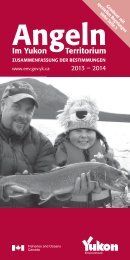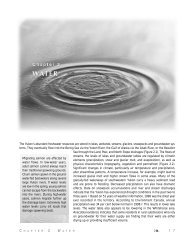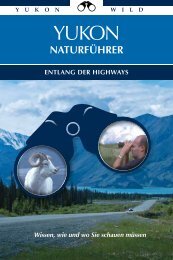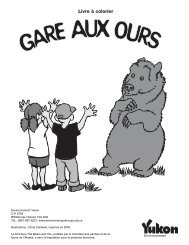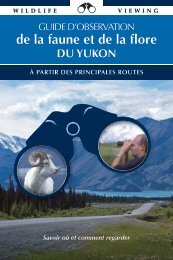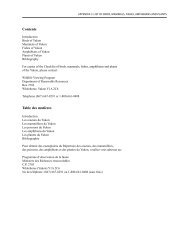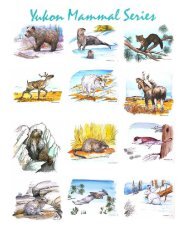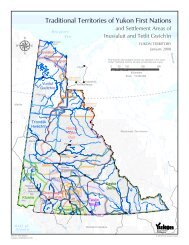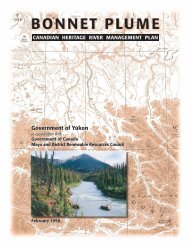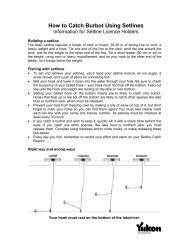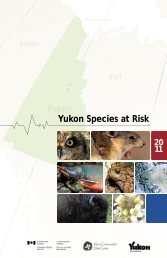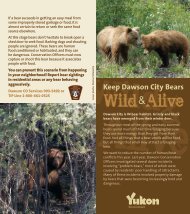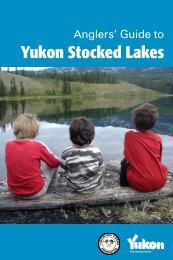Ch. 3 Land - Environment Yukon
Ch. 3 Land - Environment Yukon
Ch. 3 Land - Environment Yukon
You also want an ePaper? Increase the reach of your titles
YUMPU automatically turns print PDFs into web optimized ePapers that Google loves.
the <strong>Yukon</strong>. Permits will be required for<br />
public waste disposal.<br />
One of the most controversial issues<br />
addressed in the draft regulations is<br />
the burning of garbage at dumps.<br />
Burning is the least expensive way to<br />
get rid of solid waste and also helps<br />
control odours that can attract wildlife<br />
to dumps. But open burning can<br />
produce air pollution, and it can also be<br />
dangerous during the fire season. In<br />
the summer of 1999, a forest fire<br />
started at the Burwash dump and<br />
caused considerable damage in that<br />
community.<br />
tonnes<br />
700<br />
600<br />
500<br />
400<br />
300<br />
200<br />
100<br />
0<br />
Note: data for some commodities<br />
is not available for particular years.<br />
98/99 data<br />
97/98 data<br />
96/97 data<br />
95/96 data<br />
Aluminum<br />
Plastic<br />
Office<br />
Paper<br />
Cardboard<br />
Glass<br />
The <strong>Yukon</strong> and the Northwest<br />
Territories are the only jurisdictions in<br />
Canada where open burning is still<br />
allowed.<br />
Are we reducing our wastes?<br />
Reduce, reuse, recycle, and reclaim are<br />
the four ‘Rs’ of waste reduction.<br />
Education programs can help people<br />
learn how to reduce the amount of<br />
waste they send to the landfill. We can<br />
reduce the amount of waste we<br />
generate in the first place by shopping<br />
for more durable goods or rejecting<br />
excessive packaging.<br />
Newsprint/<br />
Magazines<br />
Tin Textiles<br />
Batteries<br />
Figure 3.16 Recyclable materials processed by Raven Recycling<br />
Per cent returns<br />
100<br />
80<br />
60<br />
40<br />
20<br />
0<br />
92/93<br />
93/94<br />
94/95<br />
95/96<br />
96/97<br />
Pallets<br />
97/98<br />
Figure 3.17 Return Rates: Beverage Container Program 1992-98<br />
Refillable<br />
Beer<br />
Bottles<br />
Compost<br />
In 1994, three quarters of residential<br />
solid waste in Whitehorse was<br />
recyclable or reusable. That figure is<br />
not thought to have changed in 1999.<br />
Some of those materials were thrown<br />
out because there was no system for<br />
handling them, but now all <strong>Yukon</strong><br />
communities have access to a nonprofit<br />
community-recycling depot.<br />
The City of Whitehorse initiatives on<br />
tipping fees and curbside pick-up of<br />
compostables through the Waste<br />
Watch program could help reduce the<br />
amount of waste dumped in the<br />
landfill by about half. The city estimates<br />
that about 21 per cent of the waste<br />
was diverted in 1999.<br />
Community Recycling<br />
All <strong>Yukon</strong> rural recycling depots ship<br />
to one of two Whitehorse recyclers;<br />
either P&M Recycling, a commercial<br />
operation, or Raven Recycling, a nonprofit<br />
society. Raven Recycling began<br />
operating in 1989, and handles most of<br />
the territory’s recycled goods. The<br />
volume of material that it collects has<br />
increased every year.<br />
The original list of items accepted for<br />
recycling included aluminum, office<br />
paper, newspaper, brown paper bags,<br />
tin (steel) cans, corrugated cardboard,<br />
plastic (PET) drink containers, used<br />
oil and household batteries (Figure<br />
3.16). Now Raven also accepts<br />
textiles, tetrapaks, auto batteries,<br />
magazines, refillable beer bottles, and<br />
compost. Most materials are shipped<br />
to Alberta or British Columbia for<br />
processing 4.<br />
Local scrap dealers contribute to<br />
recycling by reclaiming iron, copper,<br />
aluminum and batteries. In August<br />
1999, a local salvage company and the<br />
City of Whitehorse joined forces and<br />
collected a large quantity of scrap<br />
vehicles and compacted metal waste<br />
from the salvage yard and the landfill.<br />
Together they shipped more than 3,000<br />
tonnes south for recycling.<br />
5 6 ❧ Y U K O N S T A T E O F T H E E N V I R O N M E N T R E P O R T 1999<br />
98/99



